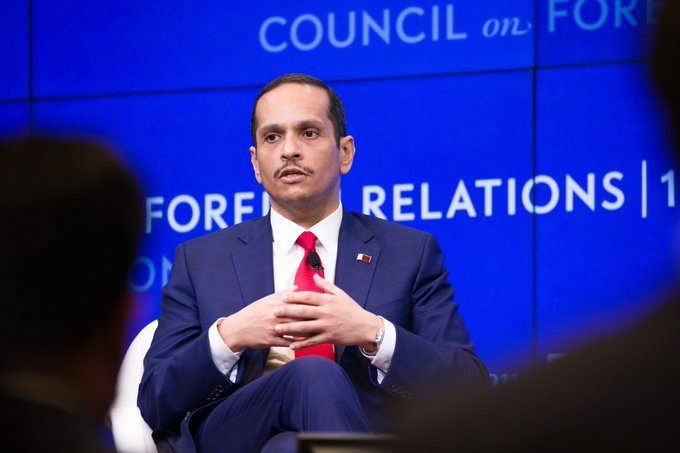“Is football an exclusive sport for certain people or a certain region? We can’t understand that. It is ironic that this tone is used in countries in Europe that call themselves liberal democracies,” the Qatari FM told Faz.
Different standards are applied by Germany when it comes to its stance on Qatar’s hosting of the World Cup and its approach to Qatari energy, Foreign Minister Sheikh Mohammed bin Abdulrahman Al Thani told German outlet Faz this week.
“We are annoyed by the double standards. On the one hand, the German population is misinformed by government politicians, on the other hand, the government has no problem with us when it comes to energy partnerships or investments,” the official said.
“It was also okay that we helped evacuate German citizens from Afghanistan. But when we host a football World Cup, want to enjoy this moment and celebrate together with the German team, then suddenly different standards apply. We can’t understand that,” the FM added.
Germany is the largest economy in Europe and is currently seeking alternative supplies to Russian gas amid a looming winter season. In May, Qatar and Germany inked a commitment to strengthen their energy partnership with an emphasis on trade in hydrogen and liquefied natural gas (LNG).
Similarly, relations between the two states were highlighted back in August 2021, when Qatar helped Berlin evacuate thousands of its nationals from Afghanistan following the Taliban takeover.
The Gulf state evacuated at least 70,000 Afghans and foreigners at the time, in what is considered to be the largest airlift of people in history.
“This is not the kind of relationship we want to see between two countries like Germany and Qatar. The relationship will always be strong. We will always be open with everyone. But we cannot accept statements based on misinformation.”
Qatar made history in 2010 when it became the first Arab country to win the bid to host the FIFA World Cup. However, it has since endured a slew of attacks from the western world, many of which target its treatment of migrant workers.
The Gulf state responded over the years by actively addressing violations of migrant worker rights, introducing major reform, some of which were new to the region. One major example is the dismantling of the controversial kafala, or sponsorship, system.
Despite its efforts to address the concerns, criticism has continued and exacerbated, with officials noting a complete disregard by critics for the progress made on the ground.
“We then also have to hear that Qatar is not a footballing nation, is not intellectually or culturally prepared to host a World Cup. Is that acceptable? Is football an exclusive sport for certain people or a certain region? We can’t understand that. It is ironic that this tone is used in countries in Europe that call themselves liberal democracies. It honestly sounds very arrogant and very racist.”
He went on to remind the audience that Qatar was rightfully crowned as the winner of the AFC Asian Cup in 2019.”We are Asian champions. What more do you want than that?”
Sheikh Mohammed’s comment come following a diplomatic spat between Berlin and Doha that was triggered by public criticism of Qatar’s hosting of the tournament by Interior Minister Nancy Faesar.
Faeser described Qatar’s hosting of the tournament as “very tricky” for the German government.
“There are criteria that must be adhered to and it would be better that tournaments are not awarded to such states,” she added.
In a statement responding to the incident, Qatar’s Ministry of Foreign Affairs summoned the German ambassador and described the comments as “against diplomatic norms and conventions, especially in light of the distinguished ties between the State of Qatar and Germany in all fields.”
‘Arrogant’ critics
Speaking to Sky News separately, the FM also said critics of the World Cup in Qatar are “arrogant” and “cannot accept a small country from the Middle East”.
“Calling to boycott the World Cup, or those who are not coming to the World Cup, it’s their decision at the end of the day, but why deprive the people and the public from attending and enjoying the World Cup.”
Concerns regarding Qatar’s human rights record, specifically regarding the migrant workers who built the stadiums, and the country’s treatment of the LGBTQ community have come up time and time again in the twelve years after it won the bid.
Most recently, English and Welsh football officials said they will continue to advocate for human rights issues in defiance of FIFA’s requests for teams to avoid engaging in politics.
Both teams have declared that they will support LGBTQ individuals by donning OneLove rainbow armbands.
Gianni Infantino, the president of FIFA, and Fatma Samoura, the secretary general, wrote to the 32 competing countries last week, saying “please do not allow football to be dragged into every ideological or political battle that exists.”
When asked about LGBTQ people visiting Qatar, the FM stated that all public demonstrations of affection, not just those between same-sex partners, are forbidden.
When questioned about prior statements that fans would be permitted to hold hands, he responded, “holding hands is not a public display of affection as far as I know.”







